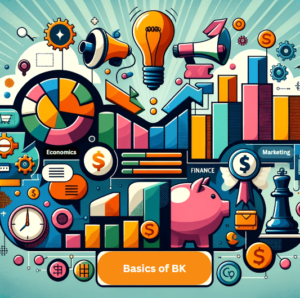In today’s rapidly evolving business landscape, possessing a robust foundation of business knowledge is not just an advantage; it’s a necessity. Business knowledge encompasses a broad spectrum of skills and understanding, ranging from the basics of management and economics to the complexities of market dynamics and consumer behavior. It’s the bedrock upon which successful strategies are built and innovative ideas are born. Whether you’re a budding entrepreneur, an established business leader, or simply a professional looking to enhance your career, a deep well of business knowledge is crucial.
This article aims to provide you with practical and actionable insights into how to gain and expand your business knowledge. We build upon the foundational concepts and emerging trends discussed in our previous articles. For a comprehensive understanding of what constitutes business knowledge, our article “Everything About Business Knowledge” offers a thorough exploration. Furthermore, to appreciate how artificial intelligence (AI) is shaping the future of business strategies and knowledge acquisition, our piece on “AI and Business Knowledge: Shaping Future Strategies” delves into the revolutionary impact of technology in the business world.
As you embark on this journey of learning and discovery, remember that the pursuit of business knowledge is a continuous process, adapting and evolving with the changing tides of the global economy. Let’s dive into the strategies and resources that can empower you on this path.
Understanding the Basics of Business Knowledge
At its core, business knowledge encompasses a wide array of concepts, principles, and skills that are essential for navigating the complex world of commerce. This knowledge forms the foundation of every successful business venture and is crucial for making informed decisions, developing effective strategies, and understanding market dynamics.
Key Components of Business Knowledge:
- Economics and Market Understanding: This includes a grasp of basic economic principles, market trends, and consumer behavior. Understanding how markets function and what drives economic activity is fundamental.
- Financial Acumen: Financial knowledge is critical. It involves understanding financial statements, budgeting, financial planning, and investment strategies. This helps in evaluating the financial health of a business and making sound financial decisions.
- Marketing and Sales Insights: Knowledge of marketing strategies, brand building, customer engagement, and sales techniques is vital in today’s highly competitive business environment.
- Management and Leadership Skills: Effective management and leadership are about guiding teams, making strategic decisions, and fostering a positive organizational culture.
- Legal and Ethical Considerations: Awareness of the legal framework surrounding business operations and adherence to ethical standards is crucial for long-term success and corporate responsibility.
- Technology and Innovation: In the digital age, understanding technological trends and how they impact business is essential. This includes digital marketing, e-commerce, and the use of data analytics.
- Global Perspective: In an increasingly interconnected world, having a global perspective on business practices, cultural nuances, and international regulations is beneficial.
For those beginning their journey in the business world or looking to solidify their understanding, diving deeper into these fundamentals is crucial. Our detailed exploration in the article “Everything About Business Knowledge” offers an extensive look at these key aspects, providing a solid foundation for anyone aiming to enhance their business acumen.
In the next section, we’ll delve into the role of artificial intelligence in shaping business knowledge, a topic we explored in depth in a separate piece, highlighting the synergy between traditional business knowledge and modern technological advancements.
The Role of Artificial Intelligence in Business Knowledge
The advent of artificial intelligence (AI) has revolutionized many aspects of our lives, and the realm of business knowledge is no exception. AI’s transformative power is reshaping how we acquire, process, and utilize business knowledge, offering unprecedented opportunities for innovation and efficiency.
Impact of AI on Business Knowledge:
- Data-Driven Decision Making: AI excels in analyzing vast amounts of data, providing businesses with valuable insights that inform strategic decisions. This capability allows for more accurate forecasting, trend analysis, and customer behavior understanding.
- Enhancing Customer Experiences: AI-driven tools like chatbots and personalized recommendation systems help businesses tailor their services to individual customer needs, elevating the overall customer experience.
- Operational Efficiency: From automating routine tasks to optimizing supply chains, AI enhances operational efficiency, allowing businesses to focus on growth and innovation.
- Innovative Marketing Strategies: AI algorithms can predict market trends and consumer preferences, enabling businesses to create targeted and effective marketing campaigns.
- Risk Management and Security: AI’s predictive analytics are instrumental in identifying potential risks and vulnerabilities, thereby improving security and risk management strategies.
- Learning and Development: AI facilitates personalized learning experiences, helping professionals update their skills and knowledge in line with evolving business landscapes.
Our exploration of AI’s role in business knowledge in the article “AI and Business Knowledge: Shaping Future Strategies” provides a deeper understanding of how AI technologies are not just tools but partners in the journey of business knowledge acquisition and application.
As we continue to witness the integration of AI in various business domains, it becomes increasingly important for professionals to embrace and understand these technological advancements. The intersection of AI and traditional business knowledge is creating new paradigms for success in the modern business world.
In the following section, we will discuss practical ways to gain business knowledge, blending traditional methods with contemporary technological advances.
Practical Ways to Gain Business Knowledge
Gaining business knowledge is a multifaceted process, incorporating a variety of resources and approaches. Whether you’re starting your business journey or looking to expand your existing knowledge base, there are several effective methods to consider:
1. Formal Education
- Universities and Business Schools: Attending business schools or universities offers structured learning and a comprehensive curriculum covering all aspects of business knowledge.
- Specialized Degrees: Degrees like MBA or Masters in Finance provide in-depth knowledge and are often aligned with current industry needs.
2. Online Courses and E-Learning Platforms
- Platforms like Coursera, Udemy, and LinkedIn Learning offer courses on specific business topics, allowing for flexible and self-paced learning.
- These courses range from introductory to advanced levels, catering to diverse learning needs.
3. Mentorship and Coaching
- Learning from experienced business professionals through mentorship provides real-world insights and personalized guidance.
- Networking events and professional associations are great places to find mentors.
4. Industry Reports and Publications
- Staying updated with industry reports, journals, and publications like Harvard Business Review or The Economist helps in understanding current trends and market dynamics.
- Such resources often provide case studies and analyses that are beneficial for practical knowledge.
5. Networking and Professional Groups
- Joining professional networks and groups allows for the exchange of ideas and experiences, offering practical insights and new perspectives.
- Platforms like LinkedIn and industry-specific conferences are excellent for networking.
6. Workshops and Seminars
- Attending workshops and seminars conducted by industry experts offers hands-on experience and knowledge about specific business areas.
- These events also provide networking opportunities with peers and experts.
7. Case Studies and Real-world Examples
- Analyzing case studies helps in understanding the application of theoretical knowledge in real-world scenarios.
- Many online courses and educational programs incorporate case studies in their curriculum.
Each of these methods aligns with the concepts discussed in our previous articles, such as understanding the basics of business knowledge and the evolving role of AI in business. By combining traditional educational methods with modern e-learning platforms and real-world experiences, you can develop a well-rounded understanding of business.
Supporting this, a study by the National Center for Education Statistics shows that business remains the most popular major among undergraduates (figure 4), indicating the value placed on formal business education. Additionally, a report by LinkedIn Learning reveals that online courses in business and technology are among the most sought-after, emphasizing the growing trend of e-learning in professional development.
In the next section, we’ll explore how leveraging technology, specifically AI, can further enhance your business knowledge, connecting back to our previous discussions on the impact of AI in business.
Leveraging Technology for Business Knowledge
In the digital age, technology plays a pivotal role in enhancing and expanding business knowledge. A variety of technological tools and platforms have emerged, enabling professionals to access, analyze, and apply business knowledge more effectively and efficiently than ever before.
Key Technological Tools:
- AI Tools and Applications
- Data Analysis and Insights: AI tools like IBM Watson and Google Analytics use advanced data analysis to provide insights into market trends, customer behavior, and business performance.
- Automated Decision Making: These tools can also assist in making informed decisions by processing complex data sets and predicting outcomes.
- Data Analytics Platforms
- Data Visualization: Tools like Tableau and Power BI help in visualizing data in an easily understandable format, making it simpler to identify patterns and insights.
- Big Data Management: Platforms like Apache Hadoop and Splunk are crucial for handling and analyzing large volumes of data, which is essential for data-driven business strategies.
- Customer Relationship Management (CRM) Software
- Customer Insights and Management: CRM tools like Salesforce and HubSpot provide comprehensive solutions for managing customer interactions, improving customer experience, and tracking sales progress.
- Project Management Tools
- Efficiency and Collaboration: Tools like Asana, Trello, and Slack enhance project management efficiency and team collaboration, essential for successful business operations.
- E-Commerce Platforms
- Online Business Management: Platforms like Shopify and Magento offer powerful tools to manage online sales, inventory, and customer engagement, crucial for e-commerce businesses.
- Educational Technology Tools
- Online Learning Platforms: Websites like Coursera, edX, and Khan Academy offer courses in business and technology, facilitating continuous learning and skill development.
Tying back to our discussion on AI in business in the article “AI and Business Knowledge: Shaping Future Strategies”, it’s evident that AI and other digital tools are not just auxiliary elements but integral components of modern business knowledge. They offer not only the means to collect and analyze data but also provide actionable insights that can shape business strategies and decision-making processes.
The effective use of these technological tools can greatly enhance one’s understanding of business dynamics and open up new avenues for innovation and growth. As we continue to embrace digital transformation, these technologies will undoubtedly become even more ingrained in the fabric of business operations and knowledge.
In the next section, we’ll explore real-world applications and case studies that highlight the practical application of business knowledge in various scenarios.
Real-World Applications and Case Studies
Understanding business knowledge is crucial, but seeing its application in real-world scenarios brings a whole new level of insight. Let’s explore some case studies and examples where the application of business knowledge has made a significant impact.
1. Amazon’s Use of Big Data and AI
- Overview: Amazon’s success is partly due to its strategic use of big data and AI. They use these technologies for personalized recommendations, inventory management, and understanding consumer behavior.
- Impact: This approach has significantly improved customer experience and operational efficiency, leading to increased sales and customer loyalty.
- Connection: This example ties back to our discussion on AI tools in Section 4 and demonstrates the practical application of AI in enhancing business knowledge.
2. Starbucks’ Market Expansion Strategy
- Overview: Starbucks’ global expansion was strategically planned using market research and cultural adaptation. They tailored their stores and product offerings to fit local preferences in various countries.
- Impact: This approach helped Starbucks gain a strong foothold in international markets, demonstrating the importance of cultural understanding in business.
- Connection: This aligns with the global perspective discussed in Section 1 and shows the importance of understanding diverse market dynamics.
3. Nike’s Digital Marketing Success
- Overview: Nike’s effective use of digital marketing and brand storytelling has greatly enhanced its brand appeal and customer engagement.
- Impact: By leveraging social media, influencer partnerships, and digital campaigns, Nike has successfully expanded its market reach and strengthened brand loyalty.
- Connection: This case study relates to the marketing insights discussed in Section 1, showcasing the power of innovative marketing strategies.
4. Tesla’s Innovation in the Automotive Industry
- Overview: Tesla’s focus on innovation and sustainability has revolutionized the automotive industry. Their business model integrates cutting-edge technology, renewable energy, and unique marketing strategies.
- Impact: Tesla’s approach has not only led to the creation of high-quality electric vehicles but also spurred industry-wide shifts towards sustainable practices.
- Connection: This reflects the concepts of innovation and technology discussed in previous sections, highlighting how they can drive industry change.
Each of these case studies illustrates the practical application of business knowledge in various contexts, from using technology for personalized customer experiences to adapting market strategies for global expansion. They showcase how a solid foundation in business knowledge, combined with the ability to adapt and innovate, can lead to remarkable achievements in the business world.
For more detailed information on these case studies, the following sources offer comprehensive insights:
- Amazon’s Big Data Strategy: Businesstechweekly
- Starbucks’ International Strategy: Stanford
- Nike’s Digital Marketing: Marketingweek
- Tesla’s Business Model: Spglobal.com
In the next section, we will discuss the importance of continuous learning and adaptation in the ever-evolving landscape of business.
Continuous Learning and Adaptation
In the ever-evolving world of business, staying current is not just beneficial; it’s imperative. The landscape of business knowledge is dynamic, with new technologies, strategies, and market trends emerging regularly. Embracing continuous learning and adaptation is key to maintaining relevance and competitiveness.
Emphasizing Continuous Learning:
- Follow Industry News: Keeping up with industry news through platforms like Bloomberg, Reuters, or specific industry blogs can provide timely insights into market changes and emerging trends.
- Subscribe to Relevant Publications: Journals and magazines such as Harvard Business Review, Forbes, and The Economist offer in-depth analyses and thought leadership on various business topics.
- Engage in Ongoing Learning: Enrolling in workshops, webinars, and online courses helps in updating skills and knowledge. Platforms like Coursera, LinkedIn Learning, and industry-specific educational programs are invaluable resources.
- Networking and Professional Groups: Active participation in professional networks and groups can offer fresh perspectives and insights into the latest business practices and innovations.
- Feedback and Reflection: Regularly seeking feedback and reflecting on your business practices helps in identifying areas for growth and adaptation.
In a world where change is the only constant, the ability to learn, unlearn, and relearn is crucial. This approach not only ensures that your business knowledge remains current but also allows you to adapt strategies and operations in response to the shifting business environment. The essence of business success in the modern age lies in agility and readiness to evolve.
Conclusion
In conclusion, gaining business knowledge is a journey that intertwines understanding fundamental concepts, embracing technological advancements, and applying insights to real-world scenarios. This exploration, grounded in continuous learning and adaptation, equips professionals to navigate the ever-changing business landscape effectively.
By leveraging diverse learning methods, staying abreast of technological trends, and applying knowledge through practical examples, you can build a robust and dynamic business acumen. Remember, the pursuit of business knowledge is continuous, evolving with the tides of global business dynamics.














